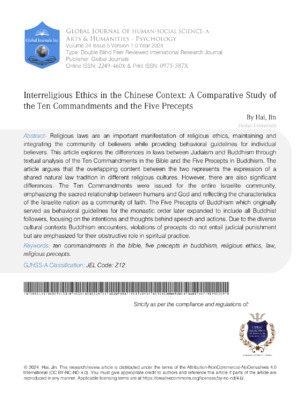Interreligious Ethics in the Chinese Context: A Comparative Study of the Ten Commandments and the Five Precepts
Keywords:
ten commandments in the bible, five precepts in buddhism, religious ethics, law, religious precepts
Abstract
Religious laws are an important manifestation of religious ethics maintaining and integrating the community of believers while providing behavioral guidelines for individual believers This article explores the differences in laws between Judaism and Buddhism through textual analysis of the Ten Commandments in the Bible and the Five Precepts in Buddhism The article argues that the overlapping content between the two represents the expression of a shared natural law tradition in different religious cultures However there are also significant differences The Ten Commandments were issued for the entire Israelite community emphasizing the sacred relationship between humans and God and reflecting the characteristics of the Israelite nation as a community of faith The Five Precepts of Buddhism which originally served as behavioral guidelines for the monastic order later expanded to include all Buddhist followers focusing on the intentions and thoughts behind speech and actions Due to the diverse cultural contexts Buddhism encounters violations of precepts do not entail judicial punishment but are emphasized for their obstructive role in spiritual practice
Downloads
How to Cite
References

Published
2024-11-05
Issue
Section
License
Copyright (c) 2024 Authors and Global Journals Private Limited

This work is licensed under a Creative Commons Attribution 4.0 International License.